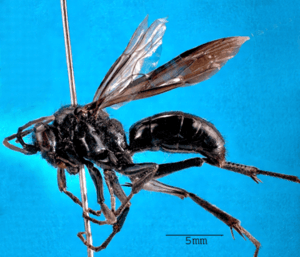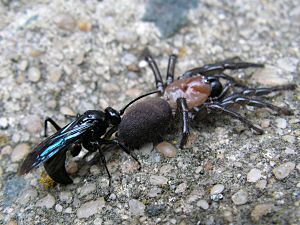Priocnemis monachus facts for kids
Quick facts for kids Priocnemis monachus |
|
|---|---|
 |
|
| Scientific classification |
|
| Kingdom: | Animalia |
| Phylum: | Arthropoda |
| Class: | Insecta |
| Order: | Hymenoptera |
| Family: | Pompilidae |
| Genus: | Priocnemis |
| Species: |
P. monachus
|
| Binomial name | |
| Priocnemis monachus (Smith 1855)
|
|
| Script error: The function "autoWithCaption" does not exist. | |
Script error: No such module "Check for conflicting parameters".
Priocnemis monachus is a super cool insect from New Zealand. It's a type of spider wasp, and people often call it the "black hunting wasp." It's actually the biggest spider wasp you'll find in New Zealand!
About Its Name
Priocnemis monachus got its first scientific name, Pompilus monachus, way back in 1855. Over the years, scientists changed its genus name a few times. Now, it's officially known as Priocnemis monachus. Sometimes, you might see it spelled wrong as P. monarchus, or called P. triangularis, but those are just other names for the same wasp.
Where It Lives
This amazing wasp lives all over New Zealand. It's an endemic species, meaning it's only found there. You'll usually find Priocnemis monachus in places where its favorite food – spiders – are plentiful. These wasps often build their nests in exposed banks, especially in forests. But they can also make homes in sand or even in gardens!
What It Looks Like
Adult Priocnemis monachus wasps have a shiny, bluish-black color, almost like metal. The males are usually smaller than the females. However, their size can vary a lot, even among wasps of the same sex. Female wasps can grow up to 26 millimeters long. Males are a bit smaller, reaching about 19 millimeters in length. Their whole body is covered in tiny black hairs.
What It Eats and Hunts
Priocnemis monachus wasps are parasitoids. This means they use other creatures to help their babies grow. Adult female wasps hunt large spiders, especially a type called mygalomorphs. When they find a spider, they will sting and paralyze it. This doesn't kill the spider, but it makes it unable to move.
The wasp then drags the paralyzed spider back to its nest. This spider will become food for the wasp's larvae (baby wasps). Some of the spiders Priocnemis monachus is known to hunt include the Porrhothele antipodiana, Cantuaria, Hexathele, Dolomedes minor, and Miturga. These wasps especially like spiders that live in burrows in the soil without a lid.
As adults, these wasps don't eat spiders. Instead, they feed on sweet things like fruit and nectar from different plants. For example, they might drink nectar from Leptospermum scoparium (which is also known as manuka or tea tree) flowers. They also enjoy the small fruits, called drupes, from the Pennantia corymbos tree.


